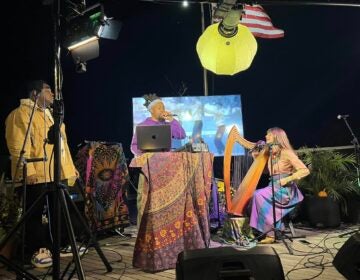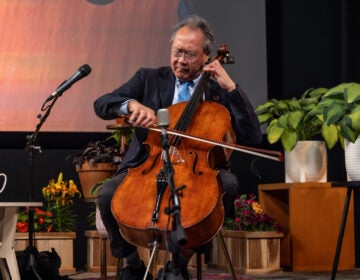Report: Plácido Domingo accused of sexual harassment by multiple women

Placido Domingo, onstage at New York's Metropolitan Opera in November 2018. (Angela Weiss/AFP/Getty Images)
Multiple women have come forward to The Associated Press to allege that Plácido Domingo, one of the world’s most powerful and recognizable opera stars, sexually harassed them in a series of incidents over the course of some 30 years.
In a report published Tuesday, the nine accusers, who include eight singers and a dancer, told the AP that beginning in the 1980s, Domingo tried to pressure them into sexual relationships by offering them jobs and opportunities in the insular and highly competitive world of opera. Several say that Domingo exacted career retribution against them when they refused him.
Born in Spain and raised largely in Mexico, Domingo enjoys one of the most durable and broad careers in opera. Most popularly, he was one of The Three Tenors, alongside the late Luciano Pavarotti and José Carreras; the trio’s first recording became the best-selling classical album of all time. At age 78, after decades of performing as a top tenor, Domingo works as the general director of the LA Opera in Los Angeles (where he has served in that role since 2003), runs a top global opera competition, conducts widely, and remains a major box-office draw at the world’s greatest opera stages, now singing as a baritone.
As part of a lengthy statement provided to NPR, Domingo said: “The allegations from these unnamed individuals dating back as many as thirty years are deeply troubling, and as presented, inaccurate.”
Seven of the accusers say that they suffered negative effects to their careers. According to the AP, some of the women say that “roles he promised never materialized” and several said that they were never hired to work with Domingo again.
New York’s Metropolitan Opera, the Philadelphia Orchestra, and the San Francisco Opera are among the high-profile opera and classical music institutions that had engaged Domingo to perform in September and October. His most recent album is Volver, a recording with guitarist Pablo Sáinz-Villegas, which was released by Sony Masterworks in 2018.
Domingo has already experienced the first fallout from the published allegations. On Tuesday morning, the Philadelphia Orchestra announced that it had rescinded its invitation for Domingo to sing at its season-opening gala, saying: “The Philadelphia Orchestra Association has withdrawn its invitation to Plácido Domingo to appear as part of its opening night concert on Sept. 18, 2019. We are committed to providing a safe, supportive, respectful, and appropriate environment for the orchestra and staff, for collaborating artists and composers, and for our audiences and communities.” The orchestra said that it will announce a replacement soloist and program at a later time.
In addition to the nine accusers, the AP reports that it has spoken to six other women who say that Domingo made them feel “uncomfortable” in his pursuits of them, and that it also spoke to “almost three dozen other singers, dancers, orchestra musicians, members of backstage staff, voice teachers and an administrator who said they witnessed inappropriate sexually tinged behavior by Domingo and that he pursued younger women with impunity.”
One such woman who worked at the LA Opera told the AP that there was a whisper network about Domingo: “Avoid interaction with him at all costs. And definitely don’t be alone with him.” Women were warned not to be alone in an elevator with him.
According to the AP, Domingo exhibited very similar patterns of behavior with the women, including calling them persistently (often late at night), expressing interest in their burgeoning careers, and urging them to meet him at his apartment or hotel room “under the guise of offering professional advice.” Two of the women say that they succumbed to his advances, “feeling that they couldn’t risk jeopardizing their careers by saying no to the most powerful man in their profession.”
One of the anonymous women told the AP that in the late 1990s, Domingo pressured her into going to his apartment near the LA Opera’s home at the Dorothy Chandler Pavilion; she was 27 and married. She said that he undressed her, undressed himself, and that they had a session of “heavy petting” and “groping.” She told the AP, “I was totally intimidated and felt like saying no to him would be saying no to God. How do you say no to God?”
Most of the women came forward to the AP anonymously; one, a former mezzo-soprano named Patricia Wulf, agreed to go public. Wulf sang with Domingo at the Washington National Opera, where he was the artistic director until 2011.
In his statement to NPR, Domingo continued: “It is painful to hear that I may have upset anyone or made them feel uncomfortable — no matter how long ago and despite my best intentions. I believed that all of my interactions and relationships were always welcomed and consensual. People who know me or who have worked with me know that I am not someone who would intentionally harm, offend, or embarrass anyone.
“However, I recognize that the rules and standards by which we are — and should be — measured against today are very different than they were in the past. I am blessed and privileged to have had a more than 50-year career in opera and will hold myself to the highest standards.”
NPR has requested comment from the LA Opera, the Metropolitan Opera and the San Francisco Opera, but those companies have not yet responded.
9(MDAzMzI1ODY3MDEyMzkzOTE3NjIxNDg3MQ001))




